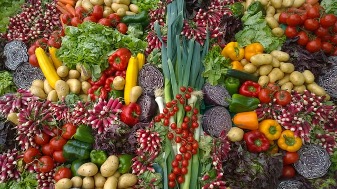Connors Farm in Danvers, MA runs a CSA and is a farm market open to the public. Connors Farm got its start in 1904 and has been the go-to farm stand for the local community ever since. Below, Connors Farm discusses the Farm-to-Table movement becoming increasingly popular among Americans who care about what they consume
Before the invention of processed food or takeout, people ate produce they grew themselves. They were assured of the quality and freshness of the ingredients and had a closer “emotional connection” to their meals—and that is what the trend of farm-to-table eating tries to recapture.
Connors Farm Explains What is Farm-to-Table?
It is the practice of buying food from local sources. It advocates seasonal, organic, and fresh food, and champions small-scale farmers who use sustainable farming methods.
Benefits of Farm-to-Table eating
Connors Farm reports that people choose farm-to-table for different reasons, ranging from personal lifestyle preferences to the larger economic impact this method of eating creates.
Higher nutritional value and flavor
Fruits and vegetables deteriorate quickly. Connors Farm explains that’s why produce that is meant to be transported or preserved are picked before they’re ripe, so they still “look good” when they reach supermarket shelves.
However, these kinds of produce have less nutritional value and flavor than those that are allowed to ripen naturally and then picked at their peak. That’s why a natural, vine-ripened tomato is sweeter and juicier—even if they look the same, they don’t taste the same.
Cleaner food, and transparent practices
Many brands claim to be “all-natural”, but it’s hard to know if it’s true since the FDA does not regulate the use of these terms on food labels.
Connors Farm says the best way to guarantee how a food is grown is to
know the source. By getting from trusted local suppliers, you have more information about their farming methods, and whether it is natural and organic as they claim.
Stronger local economy
“Buying local” means that the money goes back into the community, and not to distributors and other middlemen who are involved in a nationwide supply chain according to Connors Farm.
This benefits everyone involved. Farmers and shopkeepers can enjoy higher profits and are assured of steady business. Consumers and restaurant owners get fresh ingredients at a lower price.
And as employment rates go up, other businesses will enjoy the ripple effects of higher purchasing power and more robust spending.
Greater food variety
Farm-to-table makes it more viable for farmers to sell produce that may otherwise spoil easily during transportation or may have a smaller commercial appeal (e.g., heritage grains, seasonal fruit), according to Connors Farm.
Restaurants that support farm-to-table philosophy are also more likely to have seasonal menus, which use only the best available produce.
So whether people buy ingredients from a supermarket, or order food from a restaurant, farm-to-table helps create a bigger and better variety of food.
Lower carbon footprint
A
study by the Leopold Center for Sustainable Agriculture found that most foods are transported an 1,500 miles before it reaches the buyer.
This has a tremendous environmental impact because fossil fuels and carbon emissions.
The Conscious Challenge estimates that it takes 10kcal of fossil fuel energy to deliver the equivalent of 1kcal of energy from food.
This
does not include the environmental impact of packaging, freezing, and other methods used to preserve the food according to Connors Farm. For example, one study of the carbon footprint of food, one kilo of frozen lamb generates 39.2 kilos of carbon emissions and travels 91 car miles. You eliminate most of that by buying it fresh from a local farmer.
Natural, sustainable farming methods
Smaller farms are also more likely to practice crop rotations or plant crops when they are in season. This allows soil to recover between harvest and requires less “chemical interventions” such as fertilizers that can seep into ground and water supply.

Farm-to-Table: a growing movement
The farm-to-table movement has gained a lot of momentum, partially because of the support from celebrities and food influencers.
Celebrity chef Jamie Oliver is one of its most vocal advocates, from Farm to Fork restaurant and cooking classes, and his books and videos on the “food revolution.”
Recently, Michelin-starred chef Dan Barber even began
The Kitchen Farming Project to save small farms from closing during the pandemic. Connors Farm explains that while the project initially involved chefs in his own line of restaurants, he was able to get colleagues from all over the world to commit to join the movement.
Jessica Alba, who also founded the chemical-free brand The Honest Company, constantly talks about natural eating and locally sourced ingredients in her social media accounts. Other celebs—such as Danny DeVito, Jillian Michaels, Emily Deschanel, and Bill Maher—are equally vocal about GMOs and the right to know what’s in their food.
However, this is not just a trend. With its clear benefits, farm-to-table is now emerging as a “smarter choice”—for health, for the economy, and for the environment.
